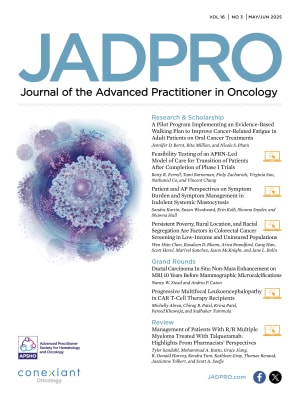Transcript
Hi there, I am Lindsay Kalhagen. I am a PA at Northwestern in Chicago and work in benign hematology. And I am going to be talking about one of the recent abstracts from ASH that I was impressed by and also felt moved by clinically and hope to share some of my thoughts. And it is Experienced or Perceived Burdens and Associated Quality of Life Impacts of Anemia and Transfusion Dependence in Myelofibrosis, A Patient Self-Report Survey.
So all of us who work with myelofibrosis know the degree that anemia plays not only in the disease, but also in treatment, and that it is a significant burden on patients. But even with knowing that and having worked with patients and ordering transfusions over many, many years, I found this poster to really be significant as far as really quantifying and evaluating reported burden and associated impacts of transfusion dependence on quality of life for patients with myelofibrosis, and really ultimately highlighting the importance of if we can, avoiding transfusion.
This was a multinational online survey study for patients that with symptomatic myelofibrosis and past treatment with JAK inhibitors. There was 155 participants, not surprisingly 88% of them were anemic. Most participants also not surprisingly reported significant anemia related symptoms, so fatigue, weakness, and this was regardless of whether or not they were anemic and that this really negatively impacted quality of life being reported by 73% of patients and more than 50% of patients not only reporting impact on quality of life being negative, but negative impact on physical activity, on how they're able to think, on their emotional health. And that ultimately improving anemia was extremely important to these participants. 60% reported transfusion is extremely or quite a bit bothersome and really felt it important to try to reduce these impacts of transfusion.
More than 50% of these reported frequent transfusion as extremely or quite a bit inconvenient. What did that mean? They separated it out further and 81% of patients reported the most inconvenient part of transfusion burden was actually the time spent in clinic for transfusion. And I think, again, we all know this, we all know this when we think about ordering transfusions and scheduling them, but most of these patients were driving from more than 20 minutes away to get to their transfusion. Then of course, the time it takes to get a type and cross, the waiting for blood to be ready, the time for transfusion as well as the monitoring. So what an impact this is, not only for the patient themselves, but we often know that many of these patients come with family, come with other support members. And so really this transfusion burden from a time perspective is really significant to patients that I think just seeing these numbers and seeing how patients perceive it themselves is really meaningful.
They also, of course, not surprising, but thinking about what are the adverse events from transfusion and also what does it mean disease-wise that I am now transfusion dependent as far as potential for progression? We know it's a negative indicator as far as overall survival. And so participants really placed to this high level of importance on how do we reduce transfusion needs and the fact that many of them actually would feel that even if they could reduce transfusion needs to once every 16 weeks, that would be clinically meaningful to them. So what I took away from this was, again, we know transfusion is a huge burden on patients, but also just really seeing the numbers and responses from patients and I think what that means to me as a provider is just really highlighting the need to educate patients about other treatment options. What are the current treatment options out there? What do we have as add-on therapies for anemia, what clinical trials are out there for anemia and myelofibrosis, and really keeping ourselves educated, educating our patients and their families as far as what are our treatment options for lessening transfusions.











